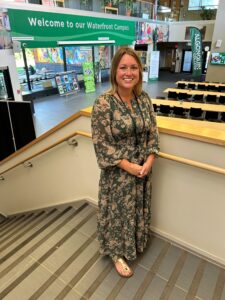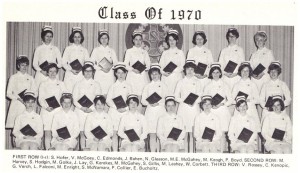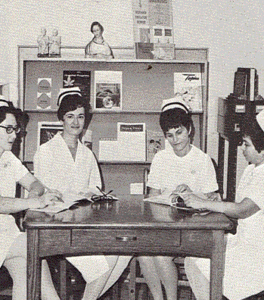Jennifer White planned on becoming a teacher, but when she learned that some graduates of teaching programs were having trouble finding work, she took a step back and started thinking about other options. She was just finishing up high school and was trying to figure out what her next steps would be. She needed a job and was working in the hospitality industry when she accepted a part-time position supporting people who had physical disabilities or developmental challenges. It changed her life. She was 20 years old, and she was getting her first taste of being an advocate.
“It was through this role that I started to make the link between the social determinants of health and positive outcomes and began to truly appreciate the real impact of systemic inequities. At a really high level, I understood that there was a broader system of economic and political policies, and systems that were not always working in the best interest of the individuals or populations they are intended to serve,” says White.

Jennifer White graduated from the Bachelor of Science in Nursing program at Algonquin College’s Pembroke campus in 2010.
White understood that if she wanted to make a difference, she needed a post-secondary education, so in the Fall of 2006, she enrolled in the Bachelor of Science in Nursing program at Algonquin College’s Pembroke campus. After completing her first year in the four-year degree program, she secured a job working as a Personal Support Worker in long-term care. Again, she felt there were opportunities to remove systemic barriers that she felt were hindering the quality of care for residents. She wanted to influence policy change and dig deeper into addressing the root cause issues in a complicated multi-tier health care system.
“I remember thinking to myself, when I am a registered nurse, I can help fix this,” White recalls.
While in college, she especially enjoyed her community health nursing project. It helped her understand change management, the value of using data to measure outcomes, and the importance of intentional planning to ensure project success. She honed her critical thinking skills, questioning “why we do the things we do and why do we do them the way we do?”
Inquisitive and determined, White was finding her passion. The textbooks, lab work and clinical placements prepared her to be a nurse, but her enthusiasm for her work would stretch beyond patient care. She thoroughly enjoyed nursing and was committed to improving health outcomes by providing evidence based, person-centered, compassionate care to her patients, but she was looking for more. She was constantly challenging herself to think more broadly about how to do things better. White’s approach to patient care and her demonstrated leadership in quality improvement did not go unnoticed.
Soon, she was in management, becoming a nurse manager and later a Director of Nursing. She learned quickly that systemic change isn’t easy to implement, but through persistence and purposeful changes, improvements can be made. Making progress takes time and it takes resources, both people and in many cases financial investments. Again, it brought White back to her role as an advocate and being a voice for the most vulnerable people in society.
By the summer of 2023, White had been working in health care for more than a decade , including time spent in the not-for-profit sector. Like everyone else she had come through a worldwide pandemic that was challenging, particularly for those working in health care. She was open to change. She applied to become the Executive Director of Renfrew County Family and Children Services and was successful. It was a big move, one that would put her on a steep learning curve, but her values hadn’t changed. She wanted to help people.
Family and Children’s Services of Renfrew County delivers adult and children’s developmental services, and child welfare with the mission of helping families and communities in Renfrew County protect and support the development and well-being of children, youth, and adults through integrated services, prevention and social inclusion. The agency believes that every child and youth needs long-lasting relationships in safe environments to flourish. It was a position that appealed to White’s inner self, an opportunity to support the family unit and try to help children succeed in life.

Family and Children’s Services Executive Director Jennifer White joined other Renfrew County representatives at the Rural Ontario Municipal Association Conference.
Since assuming the role, White has taken a deep dive into the multi-service organization to better understand where the pressure points are. That review has led her to the doors of government where she has joined a chorus of others who are pleading for a greater investment to support children and families, who are relying on her agency for help.
“Families are finding it extremely difficult to gain access to early supports, interventions and treatments for their children, especially children with developmental, behavioural, and complex needs. As a result, we are tragically seeing kids coming into care because families are exhausted and have reached a breaking point,” says White.
The goal of the work White leads is to support and strengthen children and families. Her teams work hard to ensure that developmental and behavioural needs are met, and to provide or connect families with the services they need to thrive and stay together – preventing children and youth from coming into care whenever possible.
The work isn’t easy. It’s tough on the front-line workers who are involved in challenging and often heartbreaking work. Agency workers need to work with families in difficult situations and rely on foster parents to provide the support needed to children who are displaced.
It requires an empathetic leader who can support people and build relationships while also navigating their way through the sometimes complicated circumstances that place children and families at risk. At a time when many families are struggling under the weight of socio-economic issues such as the high cost of the basic necessities of life, food and housing, relationships can break down. When children are involved, Family and Children Services are brought in to address challenging situations. The nature of the work can take be stressful and every situation is different, requiring White and her colleagues to assess and act in the best interests of everyone involved. That means tough decisions are often necessary to make, decisions that don’t please all parties.
White realizes she doesn’t have all the answers, but she’s getting pretty good at telling her organization’s story. Recently she was in Toronto with other County of Renfrew representatives, speaking to Ministers and government officials at the Rural Ontario Municipal Association conference. Her message was clear. “We need adequate and stable funding for the critical supports we provide as a multi-service organization supporting vulnerable children, youth and families in rural Renfrew County. It will help us ensure improved outcomes but also reduce the risk factors for involvement with child protection services.”
As she settles in at Family and Children Services, White is making the connections she needs to advance her advocacy work, while also reflecting on her approaches and continually learning from both her successes and her mistakes. It’s a skill she learned while studying at Algonquin College where she journaled and embraced the power of reflecting on her day-to-day work.
White can be hard on herself, but with time she has become a more confident leader. “What I can say is that I do take the time to reflect on the small and large interactions and activities I engage in on a daily basis, try to give myself kudos for the good stuff – but also actively critically assess my actions and interactions to discover opportunities for improved practice,” says White.
Spoken like a nurse and a leader, always thinking critically and looking ahead to try to find solutions. From those early career experiences helping people with disabilities to her current role leading Family and Children Services, Jennifer White has found her voice. Just ask her. She’s an advocate and visionary. She has lots of ideas and is investing the time and energy needed to make things better in her community.
(Posted by Jamie Bramburger, Interim Dean of Pembroke Campus)



